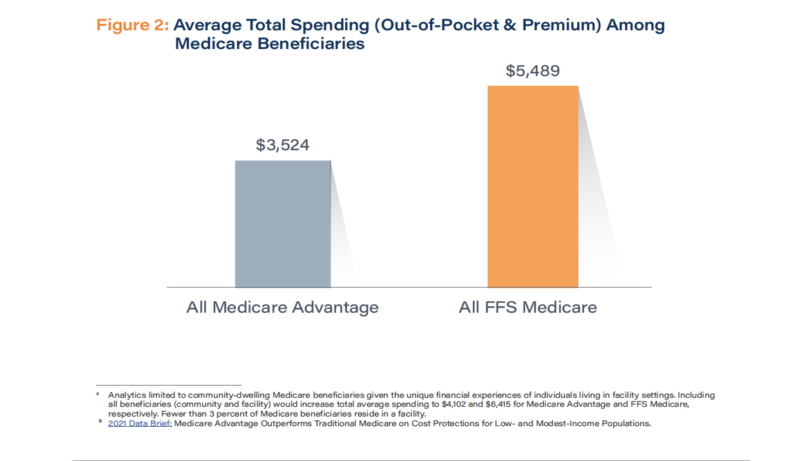Study: Medicare Advantage Saves Seniors Nearly $2,000 a Year Compared to FFS Medicare
Survey data shows consumer savings persist across race and ethnicity as MA beneficiaries report a 35% lower rate of cost burden compared to FFS Medicare.

Washington, D.C. – Better Medicare Alliance, the nation’s leading research and advocacy organization supporting Medicare Advantage, unveiled a new analysis conducted by ATI Advisory finding that Medicare Advantage beneficiaries report $1,965 less in total annual health spending (out-of-pocket costs and premiums) than those in fee-for-service (FFS) Medicare.
The study is based on 2019 Medicare Current Beneficiary Survey (MCBS) data, the most recent year available, and comes as new polling from Kaiser Family Foundation shows that addressing seniors’ out-of-pocket costs are among Americans’ top concerns for policymakers.
Findings indicate an increase of $325 in consumer savings compared to last year’s report. ATI Advisory’s 2021 analysis using 2018 MCBS data found $1,640 lower health spending in Medicare Advantage while an earlier study showed a savings of $1,598.
Further, research shows that consumer savings in Medicare Advantage persist across race and ethnicity. Specifically, Black Medicare Advantage beneficiaries report $1,104 less in total health spending compared to FFS Medicare beneficiaries, while Latino Medicare Advantage beneficiaries see average savings of $1,421.
When considering rates of cost burden, defined as spending 20% or more of one’s income on health coverage, Medicare Advantage has a 35% lower rate of cost burden (13% in Medicare Advantage compared to 20% in FFS Medicare).
“As this study shows, the path to meaningfully addressing Americans’ concerns about out-of-pocket costs and health care affordability and access for our nation’s seniors leads us to Medicare Advantage,” said Mary Beth Donahue, President and CEO of the Better Medicare Alliance. “There is perhaps no more meaningful measurement of a program’s value than its effect on the consumer. In Medicare Advantage, we see that consumers are saving nearly $2,000 a year compared to FFS Medicare – savings that have continued to grow over recent years and are all the more valuable considering that over half of all Medicare Advantage beneficiaries live below 200% of the poverty line. With such robust cost protections across demographic groups, the value of Medicare Advantage for the Medicare dollar has never been clearer.”
“Medicare Advantage continues to demonstrate that it offers important cost protections and value for Medicare Advantage beneficiaries,” said Allison Rizer, Principal at ATI Advisory and study lead. Analytic lead Laura Benzing added, “We see particularly strong results for historically disadvantaged populations, including Black and Hispanic beneficiaries and those who are low-income.”
“Latino communities need and deserve coverage options that protect their health and financial wellbeing in equal measure. More than half of all Medicare-eligible Latinos continue to find that in Medicare Advantage,” said Elena Rios, MD, MSPH, MACP, President and CEO of the National Hispanic Medical Association. “The consumer savings seen across race and ethnicity, and the over $1,4000 in average annual savings specifically experienced by Latino beneficiaries, is a testament to Medicare Advantage’s continued role as a health coverage affordability and equity leader.”
“As advocates for underrepresented consumers, we are pleased with the report’s findings about the strong cost protections and lower costs available to seniors who choose Medicare Advantage. With average annual savings of nearly $2,000 compared to fee-for-service Medicare and the peace of mind that comes from an annual limit on out-of-pocket expenses, Medicare Advantage continues to prove its significant health care value to seniors,” said Linda Sherry, Director of National Priorities for Consumer Action.
“This study proves the worth of Medicare Advantage’s patient-centered approach to meet the clinical needs of underserved populations and lower out-of-pocket medical costs. These equity-enhancing lessons can serve as an example to inform the rest of the US health care system,” said A. Mark Fendrick, MD, Director of the University of Michigan’s Center for Value-Based Insurance Design and Member of Better Medicare Alliance’s Council of Scholars.
Read the full data brief here.
###
